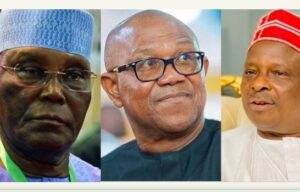2027 Political Realignment: Key Roles for Atiku, Obi, El-Rufai, Kwankwaso and Others
2027 Political Realignment: Key Roles for Atiku, Obi, El-Rufai, Kwankwaso and Others

In the face of the challenges posed by the so-called “cabal” within the presidency during former President Buhari’s administration, one prominent figure succeeded in securing a fair playing field within his party, enabling him to clinch the presidential ticket. However, the expectation was that the party would return to its foundational principles and focus on implementing campaign promises. Instead, what emerged was a stronger form of imposition, with the party essentially becoming a subordinate entity to the presidency. This development hindered progress, as party leadership was unable to express any opinion that conflicted with the President’s agenda.
This situation highlights the need for a shift in Nigerian politics, urging leaders such as Atiku, Obi, Kwankwaso, Amaechi, Fayemi, El-Rufai, and Tambuwal to reevaluate their approach. If the status quo continues, Nigeria will struggle to improve, and we risk seeing the rise of another generation of leaders who engage in the same practices of imposition and favor-seeking, undermining democracy in the process.
A key takeaway from a recent conference, shared by a former Vice President of Ghana and presidential candidate, was the importance of politicians prioritizing national interest over personal ambition. This sentiment echoes the state of Nigerian politics today. Reflecting on the past, there is nostalgia for a time when, during the Second Republic, the president was simply an ordinary member during party meetings, while the party chairman, Chief Augustus Akinloye, led the party. To achieve such a reality, it’s crucial not to wait until after elections to act. Political leaders must start aligning themselves now to avoid repeating the mistakes made by the current ruling party, the APC.
Addressing his own experiences, the speaker admits to having been wrong in his judgment regarding his earlier political decisions. Despite facing criticism for his resignation, he chose not to stay and compromise his values. He acknowledges that his resignation might have been seen as a mistake by some, but he stands by his decision, stating that if President Tinubu proves him wrong, he will be the first to publicly apologize.
However, as long as the President continues down a path contrary to his promises, the speaker will persist in opposing the current administration. He stresses that life is about making choices and learning from past mistakes. Moving forward, he is committed to engaging with political leaders to ensure they do not repeat the same errors of previous administrations. He emphasizes that despite their past mistakes, if these leaders are willing to admit they were wrong and work collaboratively for the greater good, he would have no problem supporting such a shift.
Ultimately, the speaker believes that Nigerians must have confidence that the country can be steered in the right direction, as long as political leaders embrace change and work together towards a better future.
TRENDING SONGS
 NPMA Appeals to Nigerian Government for Compensation After Lagos Market Fire
NPMA Appeals to Nigerian Government for Compensation After Lagos Market Fire
 Rest Every Four Hours, FRSC Issues Safety Guide for Fasting Motorists
Rest Every Four Hours, FRSC Issues Safety Guide for Fasting Motorists
 NNPC Boss Ojulari Bags UK Energy Institute Fellowship
NNPC Boss Ojulari Bags UK Energy Institute Fellowship
 Shock in Anambra: Bride Disappears Moments Before Wedding
Shock in Anambra: Bride Disappears Moments Before Wedding
 Nigerian Woman Returns ₦330 Million Accidentally Credited to Her Account
Nigerian Woman Returns ₦330 Million Accidentally Credited to Her Account
 APC Don Reach Morocco?’ VeryDarkMan Reacts to Seyi Tinubu Poster
APC Don Reach Morocco?’ VeryDarkMan Reacts to Seyi Tinubu Poster
 Bride Breaks Down in Tears as Wedding Meals Were Kept Secretly While Guests Go Home Hungry
Bride Breaks Down in Tears as Wedding Meals Were Kept Secretly While Guests Go Home Hungry
 Odogwu by Day, Robber by Night: How Marriage Joy Turned Into Tragedy
Odogwu by Day, Robber by Night: How Marriage Joy Turned Into Tragedy
 Nigerian Officials Allegedly Pocket N4–6B Weekly Through Smuggling Cartels at Seme–Badagry Border
Nigerian Officials Allegedly Pocket N4–6B Weekly Through Smuggling Cartels at Seme–Badagry Border
 Ahmad Yerima: Naval Officer to Face No Sanctions After Clash with Wike – Matawalle
Ahmad Yerima: Naval Officer to Face No Sanctions After Clash with Wike – Matawalle
Share this post with your friends on ![]()













